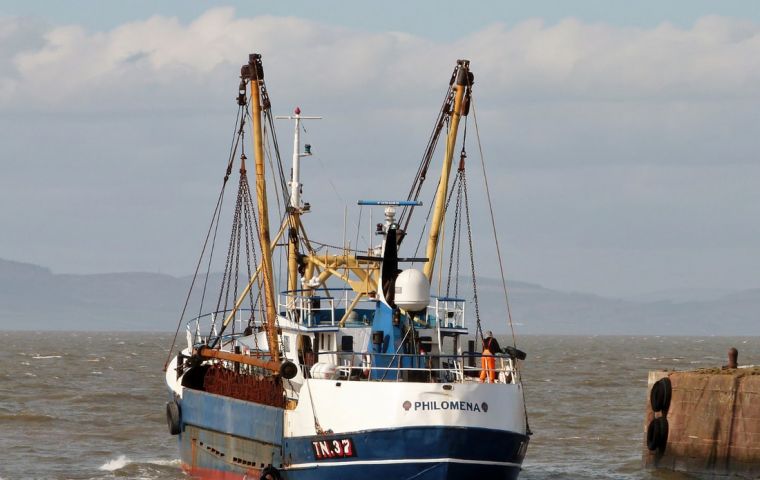MercoPress. South Atlantic News Agency
Scottish company exploiting and abusing foreign mariners
 Workers were employed by TN Trawlers and its sister companies, owned by the Nicholson family, based in the town of Annan on the southern coast of Scotland.
Workers were employed by TN Trawlers and its sister companies, owned by the Nicholson family, based in the town of Annan on the southern coast of Scotland. BBC is reporting that dozens of workers from around the world may have been trafficked into the UK to work for a small family-owned Scottish fishing firm. Thirty-five men from the Philippines, Ghana, India and Sri Lanka were recognized as victims of modern slavery by the Home Office after being referred to it between 2012 and 2020.
The workers were employed by TN Trawlers and its sister companies, owned by the Nicholson family, based in the small town of Annan on the southern coast of Scotland.
The TN Group denied any allegation of modern slavery or human trafficking and said its workers were well treated and well paid.
The company was the focus of two long-running criminal investigations but no cases of human trafficking or modern slavery have come to trial, although some of the men waited years to give evidence.
While TN Trawlers’ lead director, Thomas Nicholson, was under active investigation, TN Group companies continued recruiting new employees from across the world.
Experienced fisherman Joel Quince was 28 when he landed at Heathrow Airport in 2012, thrilled to have secured a job as a deckhand with TN trawlers.
Joel had a young family back home in the Philippines, thousands of miles away. He had been expecting to earn a good income working in the UK. He was to be paid US$1,012 (£660) a month for a 48-hour week. He caught a bus from London to Carlisle, where, he says, he was picked up by the owner’s son, Tom Nicholson Jr.
“On our way to go to the boat he told us: 'You have to give me your documents' - so without hesitation I gave all my documents to them,” he said.
Joel says he was then taken straight to the fishing ground to start working.
But he was surprised to find that his boat was the Philomena rather than the Mattanja, which was the only vessel he was authorized to work on under the terms of his visa. “This was already something fishy for me,” he said
He claims that instead of the 48-hour week he had been told about, he was working 18 hours a day, seven days a week while the Philomena was out fishing.
On his monthly wage of £660, it meant Joel was earning less than the UK minimum wage – although at that time there was no legal requirement to pay it to fishermen like him.
Joel was one of about 30 seafarers who arrived in the UK to join TN Trawlers between 2011 and 2013, mostly from the Philippines. They joined dredgers trawling for scallops along the UK coastline.
These dredgers, built in the 1970s and 80s, work by towing metal nets along the seabed. They scrape up shellfish, as well as stones and bycatch – the other marine life which gets caught in the nets. Deckhands throw back the stones and pack the scallops in ice below deck.
Several of the men the BBC spoke to had little or no fishing experience. All describe working shift patterns as grueling as Joel’s or worse.
He said there was not enough drinking water on board the vessels, and the crew were reduced to eating tomatoes from the stores to wet their throats. He also said that on one occasion a skipper threw an empty Coke can at the crew. All the men the BBC spoke to described shortages of proper clothing, food and water.




Top Comments
Disclaimer & comment rulesCommenting for this story is now closed.
If you have a Facebook account, become a fan and comment on our Facebook Page!